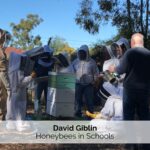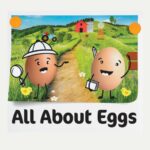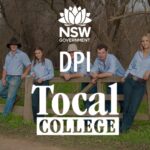It's on again!
WORKSHOP SESSION #7
TUESDAY, MAY 2 @ 11:38am
WORKSHOP TITLE: Honeybees in Schools
HOST:
David Giblin, Classroom teacher Science and Agriculture – Chifley College, Bidwill Campus
TARGET AUDIENCE: Primary teachers; Secondary teachers; Careers Advisors
WORKSHOP DESCRIPTION:
At Chifley College, we have had students working with bees for close to a decade. This presentation highlights the benefits of using bees as part of your education programs and addresses the safety concerns; bee management; equipment needs; and the biosecurity issues associated with beekeeping.
Beekeeping teaches “mindfulness”, the ability to be in the moment and focused on your own actions and their impact on the hive. Beekeeping connects you with the environment because how your bees thrive or survive will depend on what is going on in the wider environment well beyond the immediate confines of the hive.
Beekeeping allows schools to actively participate in an agricultural industry without the need for large tracts of land. A quiet corner of the school or even a rooftop is all that is required. This allows urban schools to actively engage with an agricultural enterprise. And while I will always promote ethical and good beekeeping practice, bees (being insects) don’t come with all the animal care and ethics requirements of large animal production. Find out how bees can enhance your sustainability and agricultural lessons at your school.
HOST:
David Giblin, Classroom teacher Science and Agriculture – Chifley College, Bidwill Campus
TARGET AUDIENCE: Primary teachers; Secondary teachers; Careers Advisors
WORKSHOP DESCRIPTION:
At Chifley College, we have had students working with bees for close to a decade. This presentation highlights the benefits of using bees as part of your education programs and addresses the safety concerns; bee management; equipment needs; and the biosecurity issues associated with beekeeping.
Beekeeping teaches “mindfulness”, the ability to be in the moment and focused on your own actions and their impact on the hive. Beekeeping connects you with the environment because how your bees thrive or survive will depend on what is going on in the wider environment well beyond the immediate confines of the hive.
Beekeeping allows schools to actively participate in an agricultural industry without the need for large tracts of land. A quiet corner of the school or even a rooftop is all that is required. This allows urban schools to actively engage with an agricultural enterprise. And while I will always promote ethical and good beekeeping practice, bees (being insects) don’t come with all the animal care and ethics requirements of large animal production. Find out how bees can enhance your sustainability and agricultural lessons at your school.
WORKSHOP TITLE: Tomorrow’s AgTech and attracting the talent pipeline
HOST: QLD Department of Agriculture and Fisheries
Elysa Riedel, AgTech, Innovation, Partnerships and Skills
Clare Raven, AgTech Innovation, Partnerships and Skills
TARGET AUDIENCE: Primary teachers; Secondary teachers; Careers Advisors
WORKSHOP DESCRIPTION:
Preparing young people to enter the agribusiness workforce is the backbone of Queensland Government’s Good people. Good jobs. Queensland Workforce Strategy 2022-2032 and industry’s complementary Queensland Agriculture Workforce Plan. While agribusiness jobs are the lifeblood of rural and regional communities they are also, increasingly, the hub of metropolitan business. The need to attract, train and retain a diverse and skilled agribusiness workforce that meets the demands of a global technological wave has never been stronger.Enter the Queensland AgTech Roadmap. This sets a path to accelerate AgTech innovation and cites AgTech education as a key to securing an agribusiness career. Within 10 years, 30% of agriculture roles will be automated and 11% will be augmented with increasing emphasis on innovative artificial intelligence and wearable devices. This is where the Department of Agriculture and Fisheries’ NextGen Ag program steps in. Utilising its Agribusiness Gateway Schools to Industry Schools Project, industry and schools are collaborating to deliver inspiring AgTech pilot projects in schools across Queensland. This workshop is for you if you want to learn where AgTech can take your students. With the sector expected to become a $100 billion industry by 2030, the time to prepare students is now.
HOST: QLD Department of Agriculture and Fisheries
Elysa Riedel, AgTech, Innovation, Partnerships and Skills
Clare Raven, AgTech Innovation, Partnerships and Skills
TARGET AUDIENCE: Primary teachers; Secondary teachers; Careers Advisors
WORKSHOP DESCRIPTION:
Preparing young people to enter the agribusiness workforce is the backbone of Queensland Government’s Good people. Good jobs. Queensland Workforce Strategy 2022-2032 and industry’s complementary Queensland Agriculture Workforce Plan. While agribusiness jobs are the lifeblood of rural and regional communities they are also, increasingly, the hub of metropolitan business. The need to attract, train and retain a diverse and skilled agribusiness workforce that meets the demands of a global technological wave has never been stronger.Enter the Queensland AgTech Roadmap. This sets a path to accelerate AgTech innovation and cites AgTech education as a key to securing an agribusiness career. Within 10 years, 30% of agriculture roles will be automated and 11% will be augmented with increasing emphasis on innovative artificial intelligence and wearable devices. This is where the Department of Agriculture and Fisheries’ NextGen Ag program steps in. Utilising its Agribusiness Gateway Schools to Industry Schools Project, industry and schools are collaborating to deliver inspiring AgTech pilot projects in schools across Queensland. This workshop is for you if you want to learn where AgTech can take your students. With the sector expected to become a $100 billion industry by 2030, the time to prepare students is now.
WORKSHOP TITLE: All about eggs
HOST: Australian Eggs
WORKSHOP DESCRIPTION:
Are you a primary or secondary school teacher? A parent or guardian? A school counsellor or career advisor? Join us for an egg-citing session to learn about complete lesson plans, amazing resources and links to videos that will support you in teaching your students about Australia’s Egg Industry. Also, learn about scholarships and free trainings available towards landing and building a lucrative careers in the egg industry.
HOST: Australian Eggs
- Doreen Anene, Project Manager – Innovation and Development
WORKSHOP DESCRIPTION:
Are you a primary or secondary school teacher? A parent or guardian? A school counsellor or career advisor? Join us for an egg-citing session to learn about complete lesson plans, amazing resources and links to videos that will support you in teaching your students about Australia’s Egg Industry. Also, learn about scholarships and free trainings available towards landing and building a lucrative careers in the egg industry.
WORKSHOP TITLE: Success has many faces
HOST: NSW Department of Primary Industries/Tocal College
WORKSHOP DESCRIPTION:
The NSW Department of Primary Industries (DPI) through its registered training organisation, Tocal College, is one example of an education programs that contributes directly to our agricultural workforce by engaging students with the science, skills and innovation underpinning our primary industries and the diverse range of careers available. Tocal’s courses are renowned for providing students with practical training, development of industry-relevant skills and experience in general agriculture, beef cattle, dairying, rural business management, sheep production, cropping, and conservation and land management. In 2015, DPI integrated a school education program to the suite of products delivered by Tocal to increase workforce attraction and entry. Through our work with Government, Catholic and Independent schools we see many examples of schools underwriting the future of agriculture through the delivery of education that immerses students in a variety of intensive and extensive production systems. This workshop will explore the many faces of success through Tocal College, the DPI School program and case studies of regional schools in NSW.
HOST: NSW Department of Primary Industries/Tocal College
- Michelle Fifield, Team Leader School Education Programs, NSW DPI
- Darren Bayley, Director Education, Principal Tocal College, Director Tocal Agricultural Centre, NSW DPI
WORKSHOP DESCRIPTION:
The NSW Department of Primary Industries (DPI) through its registered training organisation, Tocal College, is one example of an education programs that contributes directly to our agricultural workforce by engaging students with the science, skills and innovation underpinning our primary industries and the diverse range of careers available. Tocal’s courses are renowned for providing students with practical training, development of industry-relevant skills and experience in general agriculture, beef cattle, dairying, rural business management, sheep production, cropping, and conservation and land management. In 2015, DPI integrated a school education program to the suite of products delivered by Tocal to increase workforce attraction and entry. Through our work with Government, Catholic and Independent schools we see many examples of schools underwriting the future of agriculture through the delivery of education that immerses students in a variety of intensive and extensive production systems. This workshop will explore the many faces of success through Tocal College, the DPI School program and case studies of regional schools in NSW.
Get Involved
Will you help change the future of agriculture?
Support ag studies & food and fibre education across all grades of Australian school.
Get our free resources
Sign up for new resources, teaching tools & food / fibre educational materials!




